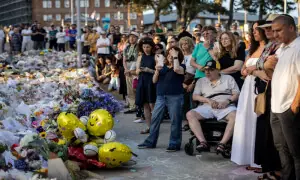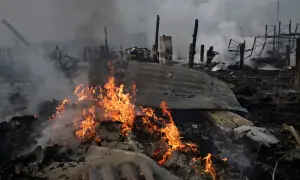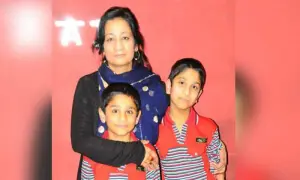Syrian govt denies military ordered revenge attack on Alawites minorities
A Syrian government fact-finding committee confirmed on Tuesday that more than 1,426 people died in violent outbreak of attack on security forces in March. Alawites were also killed in a mass number, but concluded that commanders had not given orders for the revenge attacks.
The violence that unfolded in Syria’s coastal region began with the attack on government security forces and quickly escalated into brutal reprisals that also targeted the country’s Alawites minorities, a sect to which Assad belonged.
The names of the suspects have been handed over to courts, but they have not been revealed in public yet. According to committee spokesperson, Yasser Farhan, 31 individuals believed to be responsible for violence against civilians, have been arrested.
Also six people were described as loyalists from the Assad-Era security apparatus.
According to Syria’s Supreme Alawite Council released a report, they have called the act as an “imprudent play”, and simultaneously, they accused the government led by new president Ahmed al-Sharaa, for turning a blind eye over the attack.
In a statement , the council rejected the committee’s conclusions and called for international probe under United Nation supervision. The frustration isn’t new.
A separate investigation was conducted by Reuters last month documented even more deaths 1,479 Alawites killed across 40 different locations.
They further claimed to uncover direct links between the perpetrators and figures within Syria’s current leadership in Damascus.
The safety of minorities has become a major issue again this month with hundreds of people killed in clashes between government security forces, Sunni Bedouin fighters, and militants from the Druze sect in the southern province of Sweida. The authorities have set up a new fact-finding committee in response.
were the worst violence to hit Syria since the downfall of President Bashar al-Assad last year. The fact-finding committee’s work is seen as an important test of the new leadership, made up mainly of former anti-Assad rebel fighters, who are facing new unrest this month involving other minority groups in the southwest.
The committee concluded that Syrian commanders did not give orders to commit violations and, in fact, gave orders to halt them.
It came up with a list of 298 suspects involved in violations against Alawites and 265 involved in the initial attack on security forces, committee head Jumaa Al-Anzi said.
The names are not being released publicly for now and have been referred to courts for further investigations, spokesperson Yasser Farhan said.
He added that 31 people who committed violations against civilians had been arrested, as well as six people he referred to as “remnants” of the former regime.
The Supreme Alawite Council condemned the committee’s findings, describing it in a statement on Tuesday as an “impudent play.”
It said it rejects the findings of the committee, blaming the deadly attacks in March on the “de facto authority” represented by Syrian President Ahmed al-Sharaa and his government.
They called for an international and independent investigation under the direct supervision of the United Nations.
A Reuters investigation last month identified 1,479 Syrian Alawites killed and dozens who were missing from 40 distinct sites of revenge killings, and found a chain of command leading from the attackers directly to men who serve alongside Syria’s new leaders in Damascus.
Syria’s new leadership, which has roots in the insurgency led by Sunni Muslim Islamist groups against Assad, a member of the Alawite minority sect, has long sought to reassure minorities they will be safe.
Safety of minorities has become a major issue again this month with hundreds of people killed in clashes between government security forces, Sunni Bedouin fighters, and militants from the Druze sect in the southern province of Sweida. The authorities have set up a new fact-finding committee in response.
For the latest news, follow us on Twitter @Aaj_Urdu. We are also on Facebook, Instagram and YouTube.





















Comments are closed on this story.